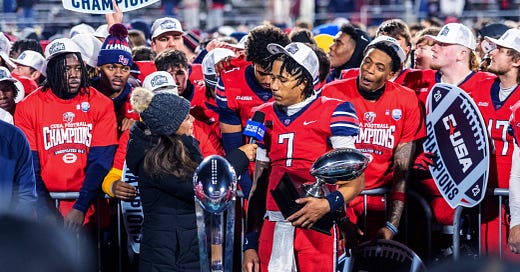Liberty's football strategy is as naked as it is effective
The controversial Evangelical school in Virginia is using its football team to reshape the university's image. So far, it seems to be working
Upon its establishment in 2014, the College Football Playoff and the remainder of the New Year’s Six bowl games came with a wrinkle – one of the 12 spots available in the sport’s most prestigious showcases would be guaranteed to the highest-ranked team from outside of the Power Five conferences.
Only once in the playoff’s 10-year existence has a team from one of those leagues made the four-team field, but each year, a tradition-rich bowl played in a large stadium and in front of millions of viewers nationally lends a spot on the stage to a program unaccustomed to such attention. Under this format, these teams and schools are given something of a crumb in a system in which they’re so often denied anything close to a sizable piece of the pie.
In past years, it has rewarded some familiar faces, the kinds of programs many figured would benefit when the Group of Five carve-out was introduced. Boise State, UCF and Cincinnati come immediately to mind.
There have been more surprising inclusions, as well. Western Michigan, which had previously won more than eight games just twice in program history, made the Cotton Bowl after going 13-0 in the 2016 season. Tulane, which had largely existed as a punching bag in its post-World War II history (outside of a glorious 1998 season), crashed the party in 2022 – and, once there, toppled USC and Heisman Trophy winner Caleb Williams.
This year, though, might feature the most unlikely guest yet.
On Monday, No. 8 Oregon will face off against No. 23 Liberty in the Fiesta Bowl. Liberty is a sizable underdog, with the line currently at 17 points, but measuring the Flames’ success by how they fare in the game undersells the whole point. That they even got here is remarkable. In just their sixth season as an FBS program, they’re one win away from finishing off an undefeated regular season and earning what would be, by far, the biggest win in their history.
Of course, whatever transpires on the field is only a part of Liberty’s story.
The Evangelical school in Lynchburg, Va. is a major college football neophyte, but the college itself, practically by design, has been a perpetual lightning rod for controversy while becoming a fixture of the country’s polarized political climate and its seemingly endless culture wars, with perhaps the most famous family in American Christianity overseeing it all.
Unlike many universities, Liberty doesn’t need to use its football team to introduce the country to itself as an institution to the country. It needs it to help others reimagine it.
How Liberty came to be, well, Liberty
Liberty isn’t just a newcomer to the world of FBS football, but American higher education as a whole.
In 1971, the school was founded as the Lynchburg Baptist College by Jerry Falwell Sr., the famous pastor, televangelist and, later, conservative activist. After offering VHS tapes to potential students as early as the 1980s, the college became one of the first to capitalize on the now-burgeoning industry of online learning around the mid-2000s.
More than 50 years after its founding, Liberty has grown considerably. It has more than 130,000 total students, only about 16,000 of whom attend the university’s Lynchburg campus, and had an endowment of $2.17 billion in the 2022 fiscal year. Under the stewardship of Falwell’s son, Jerry Falwell Jr., more than $1 billion was put into construction projects to transform the school into a sprawling 7,000-acre campus.
Despite that growth, the university has never strayed far from Falwell’s original mission.
The university maintains a strict honor code, dubbed “The Liberty Way.” Students have to attend convocation twice a week and adhere to a curfew. They cannot spend the night with a member of the opposite sex. Alcohol, tobacco products and marijuana are prohibited. Media and entertainment that are “offensive to Liberty's standards and traditions” – among the things cited are “lewd lyrics,” “anti-Christian message,” “sexual content” and “nudity” – are barred from campus.
Then there are the more insidious facets of Liberty’s institutional ethos.
While majors and courses offered at thousands of colleges across the country can be found at Liberty, its curriculum does not subscribe to well-established theories like evolution that don’t align with the university’s religious views.
That same code of conduct that outlaws behaviors that are part of a more traditional college experience is aggressively anti-LGBTQ, discriminating against members of the gay and trans communities. From the honor code:
Liberty University is bound by its Doctrinal Statement and by the teaching of the traditional biblical definition of gender, which is that humans are created by God either biologically male or female from the womb, as well as the traditional biblical definition of marriage, which is that it is only between a natural-born man and a natural-born woman. Statements and other conduct contravening this traditional biblical definition of gender or marriage are inconsistent with the Liberty University Doctrinal Position and the Bible and are not permissible for members of the university community. For example, sexual relations outside a biblically ordained marriage, romantic displays of affection with a member of the same sex (e.g., hand-holding, kissing, dating, etc.), and actions confirming denial of biological birth sex (e.g., asking to be referred to by pronouns inconsistent with one’s birth sex, using restrooms and changing facilities reserved for persons other than one’s birth sex, etc.) are prohibited by The Liberty Way.
Beyond its regressive social views, Liberty has found other ways to create trouble for itself.
Keep reading with a 7-day free trial
Subscribe to The Front Porch to keep reading this post and get 7 days of free access to the full post archives.





